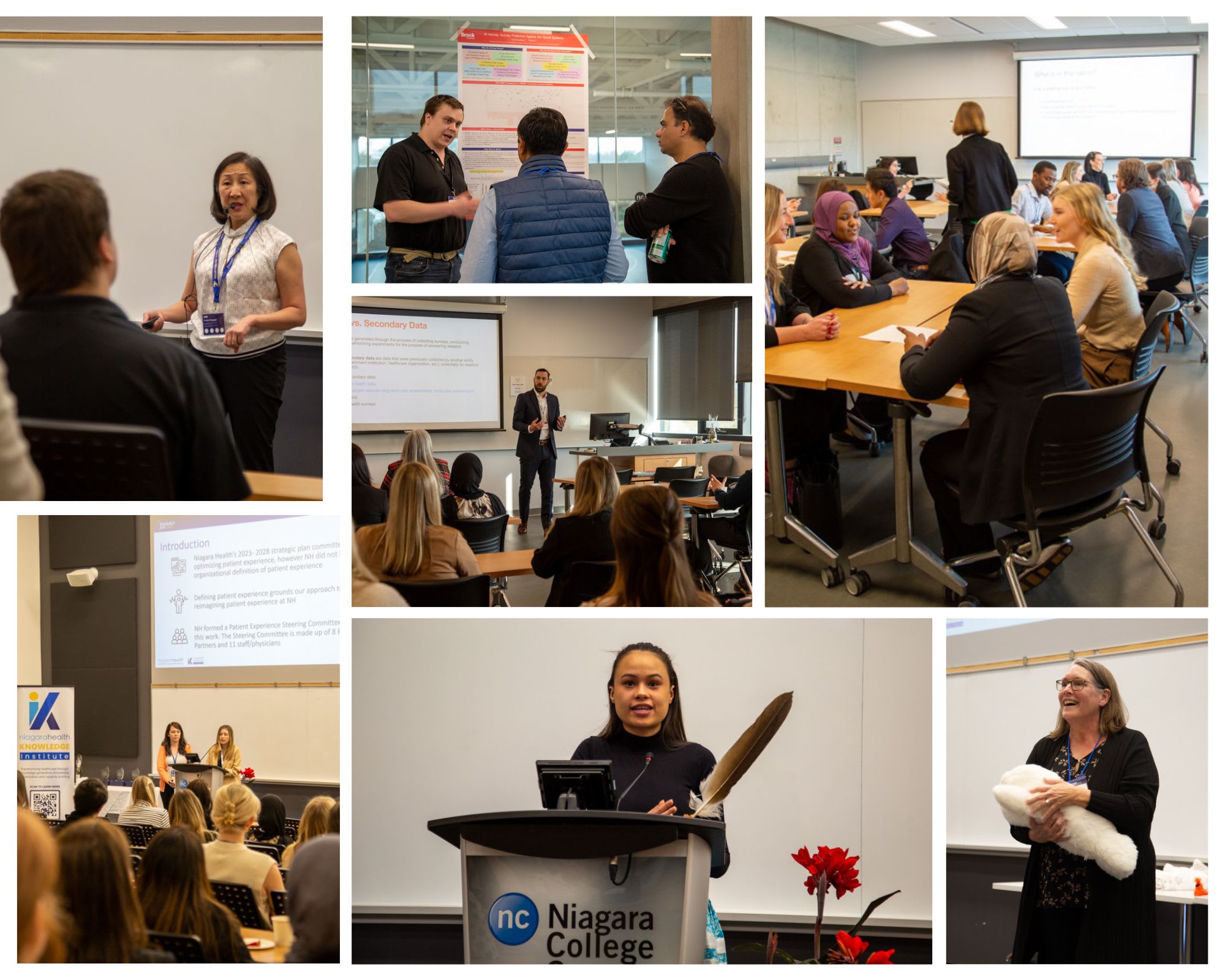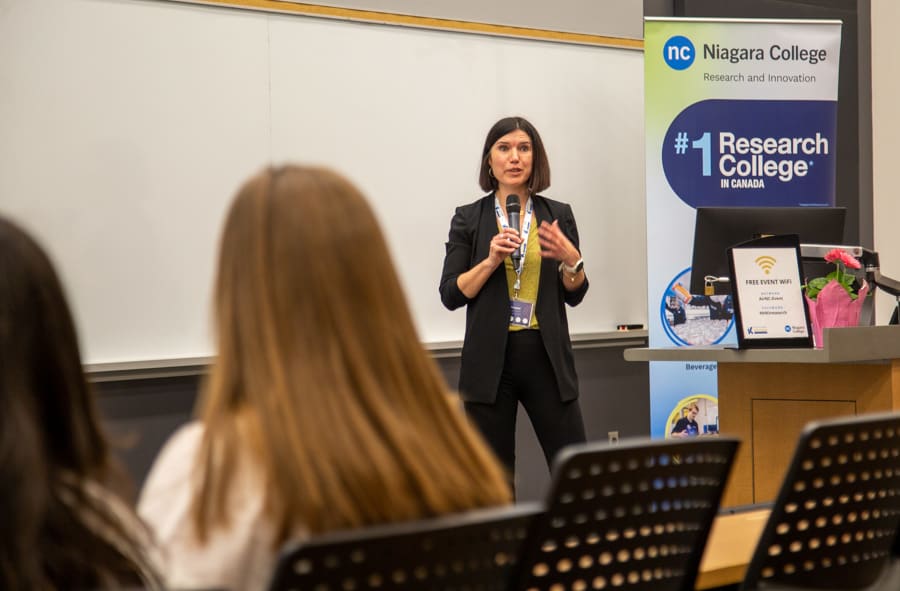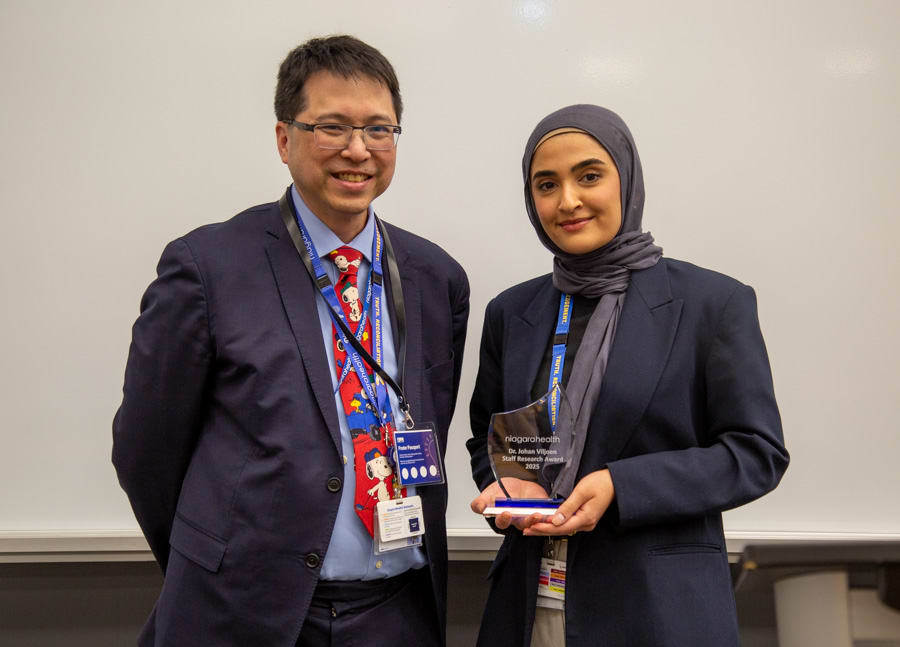
The fifth edition of the Niagara Health Knowledge Institute Research Day, hosted by Niagara College, featured poster presentations, workshops and oral presentations about local health research.
When Kerry Kuluski began her career as a health researcher, she prided herself on being a classic academic, building credibility through grants and frequent publications.
But then came a hard truth for Kuluski, now the Dr. Mathias Gysler Research Chair in Patient and Family Centred Care at the Institute for Better Health at Trillium Health Partners.
“I realized, ‘Oh, no one’s really reading the papers I’m writing. It’s not actually making a difference in the system,” Kuluski said. “And I thought, ‘I need to work very differently, so instead of being part of that top-down hierarchy, saying ‘I did the work, now just go and use it,’ (I realized) it doesn’t work that way.”
That recognition propelled her into the world of research co-design, where the patients, families and communities meant to benefit from her work were no longer subjects, but collaborators. Together, they could achieve collective impact – the idea that health systems improve only when all impacted parties are invited to the table with researchers to improve care.
“Each of us has expertise to bring to bear, but we don't have all the answers, and we don't have all of the puzzle pieces that are required” she said. “It's about working together. It's about bringing different knowledge bases together to look at complex problems that we can't solve on our own.”

Dr. Kerry Kuluski gave the keynote address at Niagara Health Knowledge Institute Research Day. Her aim was to help health researchers make their work more inclusive of those it will impact.
Kuluski shared her experiences and those of other prominent researchers during the keynote address at Thursday’s Niagara Health Knowledge Institute Research Day, where the theme was Patient Engagement and Partnership in Community Hospital Research. Her aim was to help health researchers make their work more inclusive of those it will impact – from patient to implementer – and to avoid pitfalls, including bias and tokenism.
She urged the audience to keep patients and other research contributors informed about how their input shaped work, ensuring they see their impact on both process and outcome. She also encouraged reflexivity, and a shift from thinking like an expert to thinking like an explorer – with curiosity.
“As researchers, especially early-career researchers… you can be the generation that does things differently, that leads with humility, builds with community and centres equity at every step,” Kuluski said. “The invitation is there. The question is, how will you respond?”
This year marked the fifth instalment of Research Day, which saw more than 170 attendees from nine health and academic organizations across the Greater Toronto Area gather at Niagara College’s Daniel J. Patterson Campus in Niagara-on-the-Lake. The day also featured a few milestones, including the release of the NHKI’s second annual Research Report, which highlights its successes in training the next generation of health researchers.
Recognizing research excellence
The work of Niagara Health researchers was also spotlighted with the presentation of the annual Research Awards. A new award was introduced this year to recognize NHKI research staff, joining the Medical Staff Association Physician Research Award and the Dr. Johan Viljoen Staff Research Award.
“The award winners really embody the heart of who we are at Niagara Health,” said Elaina Orlando, NHKI Research Manager and Research Day organizer. “They are each exceptionally skilled at their jobs, but they also go above and beyond to ensure our team and our organization are successful, doing so with kindness and humility.”
Clinical Research Co-ordinator Kailee Morrison was the inaugural recipient of the NHKI Research Staff Award. Morrison played a key role in establishing and growing the thrombosis research program, while stepping in to support other clinical research at Niagara Health. She also “exemplifies a commitment to capacity building by consistently acting as a positive mentor for new staff and students,” said Dr. Jennifer Tsang, NHKI Executive Director and Chief Scientist, who presented the award.
Intensivist Dr. Natascha Ovtcharenko received the Physician Research Award for her efforts as one of the physician co-leads of the Critical Care Research Program. In that role, she has acted as a co-investigator on seven national multi-centre clinical trials in critical care. She also supported clinical research co-ordinators across eight programs, ensuring their research order sets were optimally and effectively built into the new Hospital Information System (HIS).

Niagara Health Chief of Staff Dr. Kevin Chan with Fatima Mehmood, an applications analyst who won the Dr. Johan Viljoen Staff Research Award.
Applications Analyst Fatima Mehmood received the Staff Research Award for her critical support during the HIS transition.
“Fatima continuously went above and beyond the requirements of her role to support the research team, making them feel like they were heard, understood and valued,” said Dr. Kevin Chan, Chief of Staff and Executive Vice-President of Medical Affairs, who presented the award. “Fatima’s skill, thoughtfulness and positivity were not only an invaluable asset to the research team during the HIS project, but they continue to be an asset to the organization and reflect the qualities that embody Niagara Health’s core values.”

